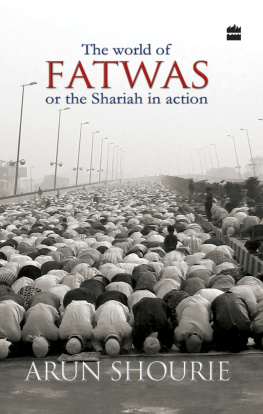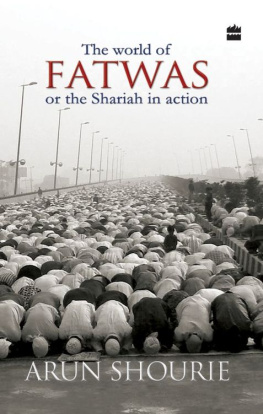Shmuel Bar - Warrant for Terror: The Fatwas of Radical Islam and the Duty to Jihad
Here you can read online Shmuel Bar - Warrant for Terror: The Fatwas of Radical Islam and the Duty to Jihad full text of the book (entire story) in english for free. Download pdf and epub, get meaning, cover and reviews about this ebook. year: 2008, publisher: Rowman & Littlefield Publishers, genre: Religion. Description of the work, (preface) as well as reviews are available. Best literature library LitArk.com created for fans of good reading and offers a wide selection of genres:
Romance novel
Science fiction
Adventure
Detective
Science
History
Home and family
Prose
Art
Politics
Computer
Non-fiction
Religion
Business
Children
Humor
Choose a favorite category and find really read worthwhile books. Enjoy immersion in the world of imagination, feel the emotions of the characters or learn something new for yourself, make an fascinating discovery.

- Book:Warrant for Terror: The Fatwas of Radical Islam and the Duty to Jihad
- Author:
- Publisher:Rowman & Littlefield Publishers
- Genre:
- Year:2008
- Rating:5 / 5
- Favourites:Add to favourites
- Your mark:
- 100
- 1
- 2
- 3
- 4
- 5
Warrant for Terror: The Fatwas of Radical Islam and the Duty to Jihad: summary, description and annotation
We offer to read an annotation, description, summary or preface (depends on what the author of the book "Warrant for Terror: The Fatwas of Radical Islam and the Duty to Jihad" wrote himself). If you haven't found the necessary information about the book — write in the comments, we will try to find it.
Shmuel Bar: author's other books
Who wrote Warrant for Terror: The Fatwas of Radical Islam and the Duty to Jihad? Find out the surname, the name of the author of the book and a list of all author's works by series.
Warrant for Terror: The Fatwas of Radical Islam and the Duty to Jihad — read online for free the complete book (whole text) full work
Below is the text of the book, divided by pages. System saving the place of the last page read, allows you to conveniently read the book "Warrant for Terror: The Fatwas of Radical Islam and the Duty to Jihad" online for free, without having to search again every time where you left off. Put a bookmark, and you can go to the page where you finished reading at any time.
Font size:
Interval:
Bookmark:
WARRANT FOR TERROR
Fatws of Radical Islam
and the Duty of Jihd

HOOVER STUDIES
IN POLITICS, ECONOMICS,
AND SOCIETY
General Editors
Peter Berkowitz and Tod Lindberg

OTHER TITLES IN THE SERIES
Uncertain Shield:
The U.S. Intelligence System
in the Throes of Reform
by Richard A. Posner
Fight Club Politics:
How Partisanship Is Poisoning
the House of Representatives
by Juliet Eilperin
Preventing Surprise Attacks:
Intelligence Reform
in the Wake of 9/11
by Richard A. Posner
WARRANT FOR TERROR
Fatws of Radical Islam
and the Duty of Jihd
SHMUEL BAR

ROWMAN & LITTLEFIELD PUBLISHERS, INC.
The Hoover Institution on War, Revolution and Peace, founded at Stanford University in 1919 by Herbert Hoover, who went on to become the thirty-first president of the United States, is an interdisciplinary research center for advanced study on domestic and international affairs. The views expressed in its publications are entirely those of the authors and do not necessarily reflect the views of the staff, officers, or Board of Overseers of the Hoover Institution.
www.hoover.org
Published in the United States of America
by Rowman & Littlefield Publishers, Inc.
A wholly owned subsidiary of The Rowman & Littlefield Publishing Group, Inc.
4501 Forbes Boulevard, Suite 200, Lanham, Maryland 20706
www.rowmanlittlefield.com
PO Box 317
Oxford
OX2 9RU, UK
Distributed by National Book Network
Copyright 2006 by the Board of Trustees of the
Leland Stanford Junior University
Published in cooperation with the Hoover Institution at Stanford University.
First paperback edition 2008
All rights reserved. No part of this publication may be reproduced, stored in a retrieval system, or transmitted in any form or by any means, electronic, mechanical, photocopying, recording, or otherwise, without written permission of the publisher.
British Library Cataloguing in Publication Information Available
Library of Congress Cataloging-in-Publication Data
Bar, Shmuel.
Warrant for terror : fatwas of radical Islam and the duty of jihad /
Shmuel Bar.
p. cm.(Hoover studies in politics, economics, and society)
Published in cooperation with Hoover Institution.
Includes bibliographical references and index.
1. TerrorismReligious aspectsIslam. 2. Jihad. 3. Fatwas.
I. Title. II. Series.
HV6431.B353 2006
363.3251dc22 2006001837
ISBN-13: 9780-742551206 (cloth : alk. paper)
ISBN-10: 0742551202 (cloth : alk. paper)
ISBN-13: 9780-742551213 (pbk. : alk. paper)
ISBN-10: 0742551210 (pbk. : alk. paper)
 The paper used in this publication meets the minimum requirements of American National Standard for Information SciencesPermanence of Paper for Printed Library Materials, ANSI/NISO Z39.481992.
The paper used in this publication meets the minimum requirements of American National Standard for Information SciencesPermanence of Paper for Printed Library Materials, ANSI/NISO Z39.481992.
Contents
Preface
THIS BOOKthe result of a long-standing interest in the use of Islamic religious arguments to justify acts of violence and terrorismis based on a large corpus of documents collected over many years. The main findings arising from these documents were first published in Policy Review 125 (JuneJuly 2004). Reactions to that article showed a growing public interest. That, along with the need to elaborate on some of the issues, led me to return to the topic.
I am grateful to the Hoover Institution and particularly to Peter Berkowitz and to Tod Lindberg for encouraging me to write this book and for enabling its publication. I am also indebted to Professors Yohanan Friedmann, Isaac Hasson, and Ella Landau-Tasseronall of the Hebrew University of Jerusalemand to Dr. Israel Elad-Altman of the Interdisciplinary Center of Herzliya for their erudite and useful comments. I would also like to thank my wife, Tali, my children, Einat, Amitai, and Roni, and my mother, Lili Matalon Rochen, for their encouragement in the course of the writing. Of course, all views, errors, and deficiencies in this book are completely my own.
Introduction
SINCE THE ATTACKS on New York and Washington on September 11, 2001, much has been written about the political, sociological, and religious motivation of Islamist terrorism. The use of Islamist, rather than Islamic, suggest its place in a list of destructive ideologiesmost recently, Nazism and communismthat have taken root during various periods in the fertile soil of Western political culture. The term also reflects a reluctance to identify acts of terrorism with the bona fide teachings of one of the worlds great religions or to recognize the derivation of the jihd phenomenon from the tenets of Islam, attributing it rather to a pent-up political hostility toward the West. Some further contend that terrorism has nothing to do with Islam, or that, if it does, it is perpetrated by extremists who have hijacked Islam. An interpretation that links Islamist terrorism to authentic religious principles or cultural traits runs the risk of being branded as bigoted and Islamophobic.
It may be assumed that the great majority of Muslims in the world have no desire to embark on a jihd of any sort against the West. Moderate Muslims argue that jihd in Islam should be interpreted as a spiritual rather than a military struggle and that the paradigm of the Prophet Muhammad should inspire his followers to tolerance, leniency, love for humankind, and the rejection of terrorism.it is not this paradigm that inspires the self-styled mujhidn of the Muslim world. Another contention is that these radicals are a marginal ideological minority or a deviant cult in Islam whose interpretation of jihd is categorically rejected by orthodox Islam and, therefore, cannot gain currency among the masses of Muslims. This argument ignores the fact that there is no religious firewall between the radicals and mainstream orthodox Muslims, leaving the latter vulnerable to the absolutist arguments of the former. Much of the preaching and many of the fatwslegal opinions of Islamic jurists that deal with the permissibility or prohibition of an actemanating from mainstream Islamic circles in Mecca and Cairo cannot be easily distinguished from those of al-Qaida. The weakness of the moderate position is evident in the discourse among Muslim scholars, particularly since September 11 and certainly since the American operation began in Iraq.
Relying on Islamic sources of authority to justify extremism is not new. As the thirteenth-century scholar Ibn Qayyim al-Jawziyya, who serves as a source for many modern fundamentalists, put it: As for the fanatics, they can place any problem upside down. When they turn to the sunnah they borrow only what corresponds to their pronouncements and contrive tricks to push away evidence that does not suit them. If they come across similarly convincing or even less convincing evidence that supports their positions, they immediately accept it and use it as an argument against their opponents. What was true in the thirteenth century is true today.
Many liberal Muslims have been engaged in cultural soul searching,draws the Muslim world into a disastrous clash of civilizations. Some of them call for immediate reform in Islam which would uproot anachronistic beliefs that legitimize radical interpretations. Although these liberals may be spokespeople for a silent majority, they are clearly a political minority, and their religious, moral, and economic sway over their societies cannot, at the moment, overcome the combined strength of the mainstream and the radicals.
Next pageFont size:
Interval:
Bookmark:
Similar books «Warrant for Terror: The Fatwas of Radical Islam and the Duty to Jihad»
Look at similar books to Warrant for Terror: The Fatwas of Radical Islam and the Duty to Jihad. We have selected literature similar in name and meaning in the hope of providing readers with more options to find new, interesting, not yet read works.
Discussion, reviews of the book Warrant for Terror: The Fatwas of Radical Islam and the Duty to Jihad and just readers' own opinions. Leave your comments, write what you think about the work, its meaning or the main characters. Specify what exactly you liked and what you didn't like, and why you think so.









